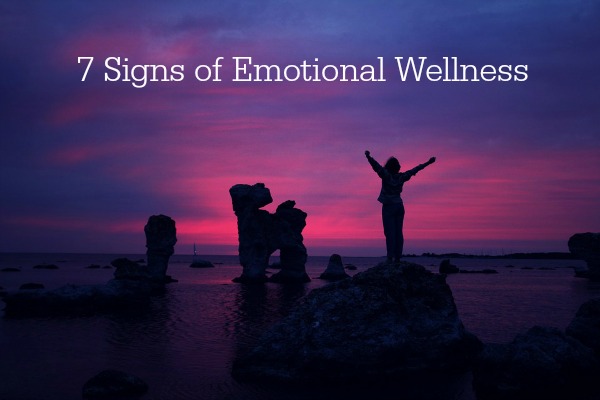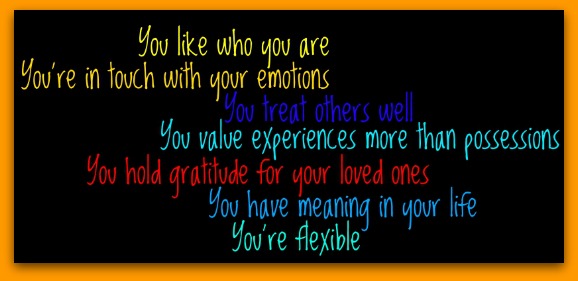Psychology Classics On Amazon

7 Signs of Emotional Wellness
Dr. Shannon Kolakowski
Want To Study Psychology?
Dr. Shannon Kolakowski is a psychologist in private practice in Seattle, helping people with depression, anxiety, and relationship issues. She is the author of When Depression Hurts Your Relationship: How to Regain Intimacy and Reconnect with Your Partner When You're Depressed and Single, Shy and Looking For Love: A Dating Guide for the Shy and Socially Anxious. Dr. Kolakowski writes a blog for the Huffington Post and has been interviewed for publications such as Redbook, Men's Health Magazine, Shape, eHarmony, and ParentMap.
Have you ever wondered what it really means to be emotionally healthy? Have you ever wondered how your psychological well-being compares to others around you?
When I meet new people in social settings, the conversational question of, "What do you do for a living?" often leads people to ask me the follow-up question, "So are you analyzing me?" While it's said in a fun, playful manner, I think it speaks to a deeper question that all of us face.
Am I emotionally healthy? Are my problems so much worse than what others are dealing with? How am I doing at life?
|
I remember being a teenager and going to visit my aunt, a child psychologist, and having the eerie sense that she must be able to see right through me and into my problems. What I didn't know then, which I now understand, is that emotional wellness isn't really about the problems you have in your life - everyone has those. It's more about how you approach the problems in life, and how much you're able to embrace the parts of life you do love. |
|
This list is a guide to the most salient factors psychologists have found in people who are emotionally well. Most of us will continue to cultivate these qualities throughout our life, as opposed to ever reaching a point where we stop and say, "Okay, I'm done now - I've reached emotional wellness." Here's the list:
1. You treat others well. Viewing other people with compassion and treating them with kindness is a hallmark of your own well-being. Psychologists call this prosociality. It means you tend to be sensitive to the needs and feelings of other people, and you think it's important to help others. It's basically the idea that you'll lend a hand to someone in need - even if it's as simple as returning a lost wallet to the front desk of a hotel lobby, or smiling and making friendly conversation with the person standing next to you in line.
2. You like who you are. When you're emotionally healthy, you generally feel pretty good about who you are. You know yourself - foibles, quirks and strengths and you're okay with what's inside. You're also congruent: congruency means that the person you show to the outside world is reflective of who you are on the inside. While there are situations where you naturally shift your attitude or behavior a bit depending on the social situation (i.e., it's normal to behave differently at a work luncheon then at a weekend picnic with friends), congruence means your overall sense of who you are feels in line with what you show others. It's the opposite of feeling like you have to wear a mask or pretend to be someone you're not. Instead, you're able to be genuine with yourself and others. You feel like you're living the life you want, not living the life that others want you to have.
3. You're flexible. People who have emotional wellness have an ability to adapt to all kinds of situations that life throws at us. You're able to assess a situation mindfully - you notice your surroundings, your emotions and other's reactions to a given situation - and then you use these factors to decide what the best course of action is. With colleagues, friendships, or your kids, flexibility is knowing that sometimes you need to talk things out, and sometimes it's best to let a situation cool off. You stand up for yourself when need be, but you're also able let others have the last word. You know how to have tough conversations and set boundaries, but you also know when to let things go. You approach life and relationships with an openness and sense of curiosity, knowing that you might need to adjust your course of action when one strategy isn't working. Flexibility is the core component of current psychological treatments because it allows you to make decisions based on your values and to make choices that will serve you well in life.
4. You hold gratitude for your loved ones. If you're emotionally healthy, it's likely you easily feel and show gratitude for the people and the things in your life. Holding gratitude is a way of purposefully looking at your life with a sense of appreciation for what you have, rather than focusing on what you are lacking. And indeed, research has shown that counting your blessings has strong benefits for emotional well-being.
Showing appreciation for your loved ones is a key factor in relationship well-being. When you show gratitude, it means that your husband or wife, your kids, your parents - the people who matter to you - know you love them and feel valued by you. It doesn't mean you don't fight or say things your regret at times, and it doesn't mean you always be have the perfect relationship. But when it comes down to it, you're able to show unconditional love and affection for your family. You give hugs, warmth, appreciation and attention freely, and you share in your triumphs together.
Next, emotional well-being depends on your receiving social support. We all need a nurturing, loving environment to thrive. This means you have people you can depend on, friends and family who have your best interest at heart. In your relationships, you feel safe to express how you feel and you feel respected and validated by those closest to you.
5. You're in touch with your emotions. Another sign of emotional wellness is that you embrace your emotions - sadness, anger, anxiety, joy, fear, excitement - as a natural and normal part of life. You handle and acknowledge your difficult emotions without becoming overwhelmed by them or by denying that your emotions exist. You know it's normal to have periods of stress, you know how to manage and express yourself when you feel upset, and you know who you can go to get comfort or help. You're feelings of sadness, anxiety and fears - while acknowledged - also aren't getting in the way of what you love to do. So if you're afraid of flying or public speaking, you manage to take the flight or give the speech regardless. Emotional health comes from being able to label, acknowledge and accept tough emotions, but also move forward from them without getting stuck. This means you might get nervous before going on date, but you don't let the nerves stop you from going out altogether.
At the same time, savoring your positive emotions - reveling in those moments of pleasure, happiness and joy when they come your way -- is also linked to well-being.
6. You have meaning in your life. Leading a purposeful life is about having a passion, a mission or larger meaning to your life. This happens when you use your strengths to help something you believe in. It might be volunteering with kids, being involved in politics, being an active part of your religious group, contributing to your neighborhood or child's school, or competing in a marathon or triathlon for a good cause. Regardless of the cause, being part of something you connect with and care about is largely associated with well-being, and volunteerism is even associated with living a longer life.
7. You value experiences more than possessions. The final component is considering the types of values you have in life. People who tend to highly value attaining wealth, popularity, or attractiveness tend to be less well-off emotionally than people who value self-fulfillment and being there for others. This means that while you might have goals for career and financial security, you also may highly value time with your family and friends. Additionally, people with high levels of well-being tend to spend their money on experiences, like going to a concert or going on a trip, rather than material possessions such as clothes or furniture. Experiences may be more meaningful than possessions because they lead to shared experiences and bonding with people, help you enjoy the beauty in the world and cultivate the positive emotions that come with new experiences.
So the mystery is revealed - emotional wellness is no longer elusive, vague or daunting. And to answer the dinner party question - no, I'm not analyzing you. I'm just enjoying our conversation with my psychologist thinking cap off, and at the most I'm deciding if we might become good friends.
Recent Articles
-
Cute Aggression: The Science Behind the Urge to Squish Cute Things
Feb 01, 25 09:04 AM
Discover the science of cute aggression: why we want to squish adorable things, its evolutionary roots, and how it helps regulate emotions. -
Abnormal Psychology: History, Debates, and Modern Perspectives
Jan 31, 25 06:16 AM
Explore abnormal psychology: its history, key debates, and modern perspectives. Learn why the term is controversial and how the field is evolving. -
Navigating Your Emotions and Finding Happiness After Childbirth
Jan 30, 25 06:19 AM
Insightful article on navigating emotions after childbirth.
New! Comments
Have your say about what you just read! Leave me a comment in the box below.Go To The Dr. Shannon Kolakowski Interview Page







New! Comments
Have your say about what you just read! Leave me a comment in the box below.